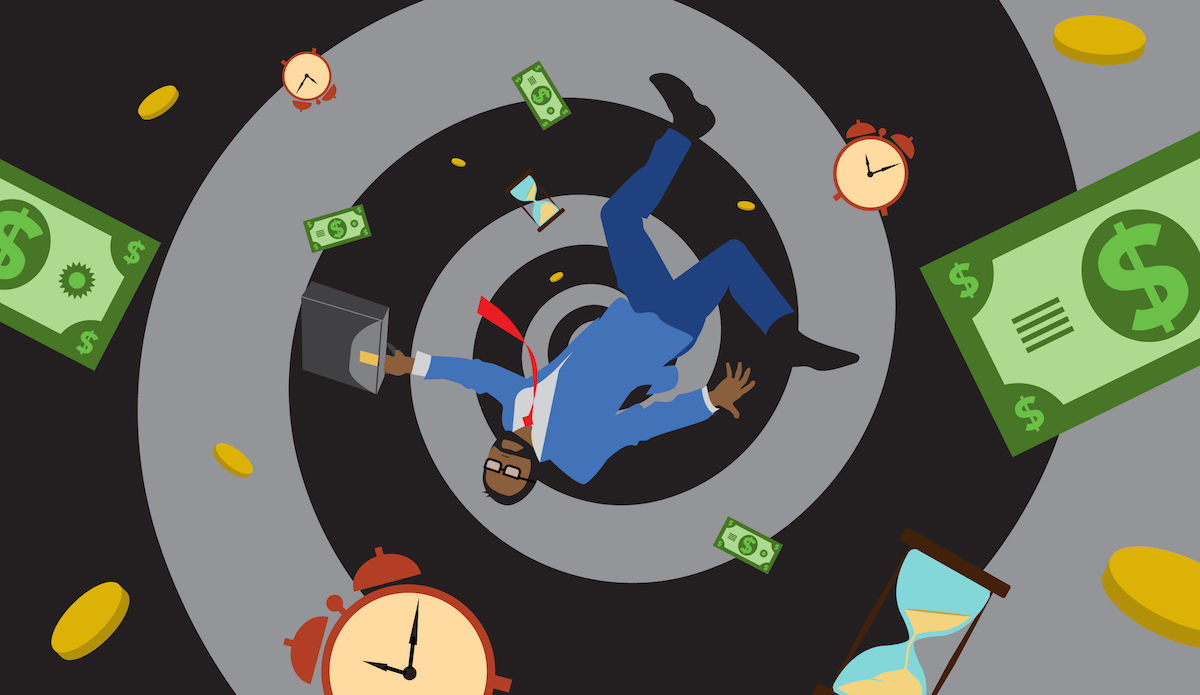Most professional firms have been marching down the path of cost-based compensation so long that it seems normal to answer questions about salaries, overhead, and even profit margins, but it is decidedly not normal. In no other industry — outside of classically-defined commodities — does the seller disclose their costs in this manner to the buyer ...
(CLICK HEADLINE TO READ ARTICLE)
Who bears the most risk in an agency-client relationship? Clients who buy hours are really only buying buckets of inputs that may or may not correspond directly with the needed outputs or produce the desired outcomes. Herein lies the risk being taken on by the client. The agency will work its hours and collect its fees regardless of whether or not the work is effective …
(CLICK HEADLINE TO READ FULL ARTICLE)
If your firm sells hours, how do your clients distinguish between paying for busy fools and eureka moments? Are they paying for middling plodders or proficient geniuses? Distracted muddlers or breakthrough brains? The billable hour, while arguably an easy thing to track, is not an easy thing to value …
The next time a client requests a set of “deliverables,” remember that this is not the real reason your firm was hired in the first place. You were hired to deliver business and marketing outcomes. The deliverables are just a means to that end …
The way to win more business is not to offer the best price, but rather the best pricing approach. Many firms will argue that their clients are “price shoppers,” and it’s true there are undiscriminating buyers in every market. But most smart clients understand you get what you pay for. The reason even some of them seem prone to “buy on price” is much more about how we sell than how they buy …
Would you like to earn money while you sleep? Most of your clients do. While most product and service companies have diverse ways of generating revenues, professional services firms generally don’t make money unless they’re recording hours on a timesheet. But an emerging crop of innovative firms across the globe are successfully cultivating new revenue streams, diversifying their sources of income, and yes, even making money while they sleep. How do they do it? Here are seven ways you can accomplish this in your own business …
While most firms are busy trying to be better than last year, truly outstanding firms are also investing in being different. Doing good work, by itself, is usually not enough to make your firm stand out. Uniqueness is discretionary …
Even if you have a “strategic plan,” you may not have a strategy. Creating a comprehensive 30-slide “plan” is comparably when contrasted with the critical thinking needed to craft a bona fide strategy. A plan can be (and usually is) fairly long, whereas a good strategy is short. The counterintuitive truth about business strategy is that it’s mostly about deciding what not to do …
(CLICK HEADLINE TO READ MORE)
In today’s unbundled marketplace, it’s essential to recognize the difference between “Upstream” and “Downstream” work not only because these two different classes of work require different talent, but also different pricing. While professional buyers will attempt to turn your service offerings into apples-to-apples comparisons, remember that the job of the seller (that’s you) is to consciously and continually identify and separate different classes of value and sell, price, and deliver them accordingly …
Do you perform an annual assessment of your firm’s strengths and weaknesses? Most of the firms in this habit have a similar way of interpreting the results: breeze right past the strengths and instead focus laser-like on the weaknesses. In extreme cases, managers ignore the findings about strengths altogether and quite literally obsess about the weaknesses. This is precisely the wrong reaction …
(CLICK HEADLINE TO READ FULL ARTICLE)
If it feels like you’re in an unrelenting race for new business, competing against agencies offering similar services in a similar way, there’s an easy way out: stop offering similar services. If you shake off the self-imposed shackles of “high utilization,” you give permission to your team to develop their ideas for services and products that can fill the unmet needs of clients. You can fly in the blue skies where no one else is flying …
(CLICK HEADLINE TO READ FULL ARTICLE)
Agencies are routinely given various “Scopes of Work,” then dutifully proceed to fulfill their client’s requests. But what’s missing from this sequence of events? What should come before the SOW? Our answer: the SOV — Scope of Value …
Most executives take great pride in showing off a long list of services and clients. Somehow they feel it is an indicator of their experience and competence. But most prospective clients have the opposite reaction. Just like the restaurant that insists on putting everything on their menu, the professional services firm that stands for everything ends up looking like they stand for nothing …
(CLICK HEADLINE TO READ FULL ARTICLE)
To thrive in a world where seemingly everyone is competition, trade the energy you put into matching competitive offerings for a more single-minded business strategy focused on differentiated, inimitable solution sets. A black box will smash a white box every time …
Why are firms like advertising agencies routinely criticized by clients for lacking the tools and practices that would make them more efficient? The answer in large part is that there are no real economic incentives in place to make these things happen. And if there's one thing economists agree on, incentives matter.
(CLICK HEADLINE TO READ FULL ARTICLE)
















